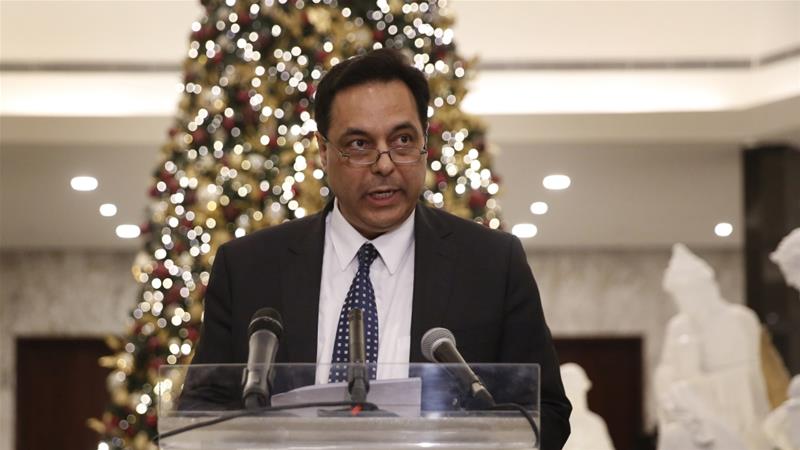BEIRUT, Feb. 7 (Xinhua) — Lebanese President Michel Aoun assured on Friday that he will not allow the security situation to get out of control, said a presidency statement. “It is very important to control the security situation in order to maintain stability and civil peace, and protect the image of the state and its […]

By Najia Houssari Financial Prosecutor Judge Ali Ibrahim on Thursday met with the Banking Control Commission of Lebanon (BCCL) to discuss claims that the owners of five Lebanese banks had moved personal funds worth $2.3 billion abroad. The meeting took place on the same day as Lebanon’s new Cabinet approved a policy statement aimed at rescuing the debt-ridden country from one of its worst economic crises in decades. The ministerial statement will now be submitted for discussion at a session of Parliament planned for next week. Parliament Speaker Nabih Berri on Wednesday revealed the bankers’ transfers and expressed his “concern over the fate of the depositors’ money.”
The BCCL has described the information on the transfers as “inaccurate” and pointed out that “all banks have made transfers, and the law does not have the right to learn who the owners are.” Berri is opposed to any attempt by banks to impose capital controls on clients’ deposits despite savings restrictions and limits on dollar transfers abroad having been in place since November last year. Meanwhile, activists in the country’s civil movement have called for new street protests against the ministerial statement which they have branded as “a revised version of the previous government’s data that does not take peoples’ demands into consideration.”

By AJ Naddaff BEIRUT (AP) — At a Beirut hospital ward, five Lebanese protesters with bandaged eyes and faces huddled in a circle, their arms wrapped around each other, and they vowed to be back on the streets soon, despite their wounds from recent clashes with police. “We are coming back,” said one of them, 20-year-old Charbel Francis. Such resolve by some protesters signals that demands for sweeping government reforms won’t be squashed easily, even as security forces throw up cement barriers and resort to more violent means of crowd control, such as rubber bullets. But the recent descent into clashes after three months of peaceful protests has also triggered introspection and divisions among the demonstrators about their next moves. More than 500 people, including over 100 security forces, have been injured in confrontations outside the Parliament building in downtown Beirut last month.
Most of the injuries occurred on January 18. For hours, protesters hurled stones, firecrackers and flares at police who responded by firing tear gas, water cannons and shooting rubber bullets. More than 150 people were injured that night, many of them struck in the head and eyes. It was a shocking reversal for a popular uprising against a corrupt political class that started in mid-October and had been characterised by its striking peacefulness — particularly compared to the bloodbath in Iraq, where a similar uprising has resulted in the death of more than 500 protesters since October, most of them shot dead by security forces.

by AFP — BEIRUT: Lebanon’s English-language The Daily Star suspended its print edition Tuesday, the latest casualty in the collapse of the country’s once-flourishing press. The newspaper, which is co-owned by the family of former Prime Minister Saad Hariri, said on its website the temporary halt of the printing presses was a result of the economic downturn. It cited “the financial challenges facing the Lebanese press which have been exacerbated by the deterioration of the economic situation in the country.” It said the temporary suspension came after “a drop to virtually no advertising revenue in the last quarter of 2019, as well as in January of this year.” In recent months, employees at the newspaper had complained of not being paid, with one departing journalist reporting in December that some were owed up to half a year in wages. A series of prominent dailies in Lebanon have disappeared from print due to funding shortages in recent years.
The Daily Star is the latest media outlet linked to the former premier to be struggling. In September last year, Hariri announced the suspension of Future TV, his ailing mouthpiece whose employees had been on strike over unpaid wages. In January 2019, the Hariri family’s Al-Mustaqbal newspaper issued its last print version, 20 years after it was established. Saudi Oger, a once-mighty construction firm that was the basis of the Hariri business empire, collapsed in 2017, leaving thousands jobless. Hariri stepped down as prime minister in late October following unprecedented natio

By BASSEM MROUE and KATHY McCORMACK — BEIRUT (AP) — A military investigative judge charged a Lebanese-American man with murder and torture of Lebanese citizens Tuesday, crimes he allegedly committed during Israel’s occupation of southern Lebanon, judicial officials said. The accusations could carry a death sentence. Amer Fakhoury is accused of working as a senior warden at Khiam Prison, which was run by an Israel-backed Lebanese militia. The prison has been described by human rights groups as a center for torture. He was detained in September after he returned to his native Lebanon from the U.S., and Lebanon’s intelligence service says he confessed during questioning to being a warden. However, Fakhoury’s lawyer and family in New Hampshire say that, while he was indeed a member of the Israel-backed militia and worked at the prison, they insist he had no direct contact with inmates and was never involved in the interrogation or torture of prisoners
Fakhoury, 57, is also undergoing cancer treatment, and it remains unclear if he’ll be able to stand trial. The restaurant owner from Dover, New Hampshire, became a U.S. citizen last year. “We have a dying American citizen there,” said his lawyer, Celine Atallah. “By keeping him there, it’s evident they’re trying to kill him.” The Lebanese judicial officials said Tuesday that the judge, Najat Abu Shakra, referred Fakhoury for trial in a military court. No date was set for the tribunal. The officials spoke on condition of anonymity because they were not authorized to speak to the media. The officials said Abu Shakra charged Fakhoury with “murder and attempted murder of prisoners inside Khiam Prison as well as kidnapping and torture.” The prison, run by the so-called South Lebanon Army, was abandoned after Israeli forces pulled out of southern Lebanon in 2000, ending an 18-year occupation.
![Prime Minister-designate Hassan Diab gives a statement following his meeting with outgoing prime Minister Saad Hariri in Beirut on 20 December, 2019 [AFP/Getty Images]](https://i1.wp.com/www.middleeastmonitor.com/wp-content/uploads/2020/02/GettyImages-1189652268.jpg?resize=1200%2C800&quality=85&strip=all&ssl=1)
by middleeastmonitor.com — Lebanese Prime Minister Hassan Diab has today signed off on the 2020 state budget and referred the plan to President Michel Aoun, with 49 members of parliament voting for the budget, while 13 voted against and eight abstained. Parliament Speaker Nabih Berri signed off on the budget earlier today while MPs from Saad Hariri’s Future Movement bloc voted against the budget, despite heading the government that originally drafted the plan. MPs from the Lebanese Forces and Kataeb Party boycotted today’s session over the unconstitutionality of a government yet to gain a vote of confidence from the legislature, adopting a budget that was drafted by a fallen government. The 17-page statement was initially passed by the parliament on 27 January, despite the session being surrounded by anti-government protesters determined to prevent MPs from convening. The plan, approved by Berri today, provides between three and 100-day deadlines to carry out the policy proposals, forecasting a six per cent deficit, plans a $700 million reduction in spending, and intends to maintain public services. However, Lawmaker Ibrahim Kanaan, chairman of the Finance and budget Parliamentary Commission, said there are concerns that projected revenues from the budget might not be realistic after three months of political deadlock has led the country into its worst economic crisis since the end of the civil war in 1990.
BEIRUT, (Xinhua) — Lebanese banks on Monday slashed by 50 percent the U.S. currency amount allowed to be withdrawn by depositors from their dollar banks accounts, local media reported. Depositors are not allowed to withdraw more than 600 U.S. dollars monthly, according to Elnashra, an online independent newspaper. Lebanon has been facing for the past […]
by today.com — By Alexander Kacala Jennifer Lopez and Shakira wowed audiences with their co-headlined halftime show on Sunday night at Super Bowl 54. The Super Bowl halftime show was full of fabulous moments, but the internet can’t seem to stop talking about one thing Shakira did. It wasn’t with her hips, it was with […]

BEIRUT (Reuters) – Lebanon’s new government will look to reduce interest rates and recapitalise banks as part of a broad plan that includes taking “painful” steps to escape a deep financial crisis, according to a draft policy statement seen by Reuters. The 17-page statement, which may still be amended, will form the basis of a confidence vote in parliament. It was agreed on Saturday by a cabinet committee that will meet again on Monday to give it final approval.
Prime Minister Hassan Diab’s cabinet was formed with the backing of the powerful Hezbollah group and its allies on Jan. 21, nearly three months after the previous one was toppled by sweeping protests against an elite seen as corrupt and wasteful. Diab must contend with dire financial strains including a dollar shortage that has shattered confidence in banks and prompted them to impose tight withdrawal limits, a sharp fall in the currency, and rising prices. The policy plan said the banking system could be stabilised by recapitalising banks and dealing with a growing number of non-performing loans, though it did not specify how. It urged quick action to avoid a “total collapse that will be difficult, if not nearly impossible, to get out of”. It said the steps would be painful but that Lebanese would “come to know one day that it was necessary”.
by news.yahoo.com —Tim O’Donnell — The foreign ministers of the 22 member states of the Arab League unanimously rejected the Trump administration’s proposal to end the Israeli-Palestine conflict unveiled last week. The resolution said the plan “does not satisfy the minimum of the rights and aspirations of the Palestinian people.” It’s considered a win for Palestinian […]



